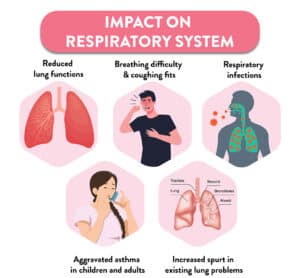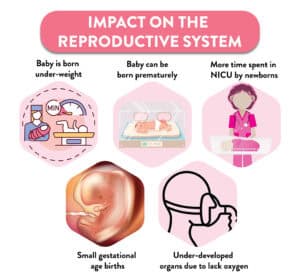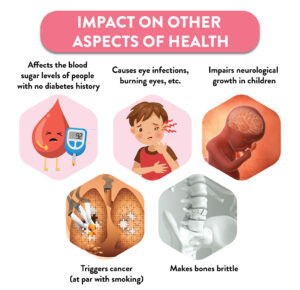How does air pollution affect your health?
Air pollution by default indicates that your respiratory system is bound to be affected. But the effects are not limited to just that. Here are some of the aspects that will be impacted:
Impact on respiratory system: Through ambient air pollution, children and adults experience one or more of the following problems:

- Reduced lung functions
- Breathing difficulty & coughing fits
- Respiratory infections
- Aggravated asthma in children and adults
- Increased spurt in existing lung problems
The World Health Organisation (WHO) in their pre-COVID research revealed that polluted air kills 600,000 children every year under the age of 15 due to lower respiratory infections.
The polluted air is laced with sulphates and black carbon. These aggravate asthma and even trigger cardiovascular problems.
Impact on the reproductive system: Air pollution can impact pregnancies as well. Expectant mothers who are exposed to ambient air pollution are seen to develop complications. Pollutants increase the chances of inflammation. This impacts the placenta and blood vessels in it which are responsible for fetal growth. This leads to birth deformities in the newborn child:

- Baby is born under-weight
- Baby can be born prematurely
- More time spent in NICU by newborns
- Small gestational age births
- Under-developed organs due to lack oxygen
- Affects the blood sugar levels of people with no diabetes history
- Causes eye infections, burning eyes, etc.
- Impairs neurological growth in children
- Triggers cancer (at par with smoking)
- Makes bones brittle
Impact on other aspects of health: Recent research suggests that ambient air pollution:

- Affects the blood sugar levels of people with no diabetes history
- Causes eye infections, burning eyes, etc.
- Impairs neurological growth in children
- Triggers cancer (at par with smoking)
- Makes bones brittle
How can I protect myself from air pollution?
The next obvious question after reading all of the above is how you can prevent them. The first step to protection starts with you.
- Dietary protection: Start by building your immunity from the inside. Load up on antioxidants to help fortify the inner linings of the lungs and protect them from infection and inflammation. Vitamin C, A & E, Omega 3 fatty acids and diuretics helps keep the respiratory passage healthy. Lower immunity will not prevent the ozone, particulate matter and other pollutants from damaging your lungs. Vitamin C helps in regenerating Vitamin E.
In the average daily intake of 40 mg/day, we should try and include:
- Green leafy vegetables like coriander and saag
- Citrus fruits like amla, orange, kiwi, lemon, pomegranates, etc.
- Sunflower oils, freshwater fishes, nuts and almonds
- Beta Carotene rich vegetables like amaranth, carrot, radish, etc.
- Turmeric, jaggery, tulsi, ginger and haritaki are some herbs and spices prescribed in Ayurveda for healthy lungs.
- Breathing exercises: To overcome the adversities of pollution, we need to strengthen our lungs. Daily 15-30 minutes of breathing exercises will help accelerate the benefits of a good diet. Pranayam for the lungs is the best approach and can be done anywhere. In addition to this, a proper sleep schedule and adequate rest, ensure your body is not under undue stress or fatigue.
- Wear a mask: We have gotten into the habit of wearing N95 masks due to the recent COVID-19 pandemic. This also helps us breathe properly when we step out in the smog. This will not only filter the air we breathe but also protect us from the immediate adverse effects. So every time you step out, put on your mask and protect yourself.
- Use air purifiers: Worldwide the sale of air purifiers has shot up due to the rise in air pollution-related problems. People indoors use this, especially in locations which are traffic heavy and have more senior citizens at home. Additionally, replace the filters of your AC to improve air quality at home.
How do we find out about air pollution levels in our area?
To understand air pollution we need to understand the ways to measure it. Currently, pollution is measured by the Air Quantity Index or AQI. It considers five chief pollutants in the air such as PM10 & PM2.5, and their levels in the air. An AQI score of 401 to 500 is considered ‘severe’. Anything above 500 is declared a ‘severe-plus emergency.
Every year Delhi’s air quality becomes the headline of every newspaper in India and with good reason. Post-Diwali pollution remains severely high with the addition of the impact of crop burning in neighbouring states. You can check your AQI real-time online on https://www.aqi.in/
How can we reduce air pollution personally?
Now that we know the impact, the preventive measures and the level of pollution in the area, the next step involves taking proactive measures to make a holistic impact in managing the environmental changes.
- If AQI is high in your area, avoid outdoor activities, and stay indoors.
- Close your windows when you turn on the AC or fan to avoid attracting extra particle pollutants.
- Change your cooking gas to a greener option like an induction stove that will reduce fuel dependency.
- Be thoughtful about your transport options. Choose greener alternatives like metro or carpooling that reduce emissions. When driving, turn off the car in idle mode to save fuel emissions.
- Buy local produce. This helps cut down shipping and transportation emissions globally.
- Prioritise renewable energy sources like solar-powered electricity to cut down on emissions and greenhouse gases.
- Try walking more, this will improve your lung strength and cut down on emissions too.
- Avoid burning wood or trash as it is one of the major sources of particulate pollutants.
- Quit smoking. Smoking indoors can also contribute to feeling suffocated indoors.
Charity begins at home. So take the first step to ensure everyone breathes easier.
How to help someone affected by air pollution?
It is always a good thing to stay alert. If you or your loved ones are affected by the exposure to smog or pollution these are the things you must do:
- Take the person to a clean open space immediately and help them take deep breaths till the suffocation subsides.
- Offer them a glass of water. Water is the best source of oxygen at that moment. Encourage them to slowly sip the water till they feel better. Drinking water will thin the mucus lining, easing their airways and lungs.
- If things don’t seem to improve, immediately seek medical help. Rush to an ENT or pulmonologist. At the CK Birla Hospitals, we have dedicated pulmonologists and a fully equipped Emergency department ready to help 24/7.
In Conclusion
If you have come this far into the article, take a deep breath. The World Health Organization (WHO) says air pollution is the leading cause of death in India, alongside high blood pressure and smoking.
While we cannot make overnight changes on policy levels, we can however try and make some efforts on our levels to ensure we are protected from the ill effects of air pollution and hope for improvements in the long run. A healthy optimised diet, protection and safe practices will ensure that you can stay unaffected for a longer time.
In case you have any kind of concerns regarding your respiratory health or are experiencing any discomfort in breathing or chest pain, do reach out to our team at the CK Birla Hospital or book an appointment with Dr Kuldeep Grover.
FAQ’s
Q1. How to stay protected from air pollution?
Look up the AQI level of your area.
- If the AQI is high avoid going outdoors
- Wear N95 masks if you must step out
- Make sure you opt for greener travel options
- Stay hydrated to keep your body’s oxygen levels stable
- Include a good dose of Vitamin C in your diet
Whenever you face trouble or problems in respiration, make sure you seek medical help immediately.
Q2. How to reduce exposure to air pollution?
- There is no better way to reduce exposure than staying indoors.
- If you have AC at home or work make sure the filters are changed regularly.
- Install an air purifier for indoor air pollution to safeguard senior citizens & patients.
- Wear a mask whenever you step out.
- Avoid areas where the AQI score is 400+
Q3. How to reduce the health effects of air pollution?
Air pollution can affect different age groups differently. However, the highest risk lies for children, expectant mothers, senior citizens and patients with pre-existing respiratory disorders.
- Make your diet strong enough to ensure your immunity is not compromised.
- Adopt green practices and wear a mask to stay protected
- Seek expert medical guidance from a professional ENT or pulmonologist to identify triggers and symptoms for timely and effective treatment.



